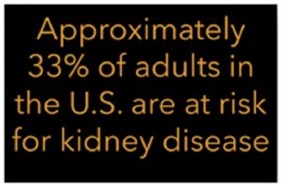Black K.A.R.E
Black K.A.R.E Central Area of The Links, Incorporated Award-Winning Integrated Program
Black Kidney Awareness Research and Education (KARE) Wins 3rd Place in Central Area Links, Incorporated Program Awards
Little Rock (AR) Chapter of The Links, Incorporated’s Black KARE program recently won a 3rd place award for integrated programing and an award for outreach and partnerships. The Chapter’s Black KARE program was awarded $15,000 by the Central Area of The Links, Incorporated. The Integrated Program award is for stellar community service raising awareness of chronic kidney disease and its impact on Black communities. Baxter Pharmaceuticals awarded $600K to Central Area Links, Incorporated to implement this program in 2021 via a competitive granting process. The Little Rock (AR) Chapter was chosen as one of 35 pilot chapters and was awarded $20K to implement it. Working with community partners, the Chapter provided nutrition and preventive health education to manage chronic diseases and to reduce the risk factors of chronic kidney failure that may result from poorly controlled hypertension, diabetes, obesity and other common conditions in Black communities. Baxter Pharmaceutical supported a competitive granting process for 3 consecutive years investing 2 million dollars in reducing chronic kidney disease. Baxter increased the grant to $800K in 2022 and the program was expanded to a national level. Little Rock Links were again chosen to participate and was awarded $10K. Baxter will again fund the program for the 2023-24 program year with a commitment of $800K. Little Rock Links plans to participate again this year.
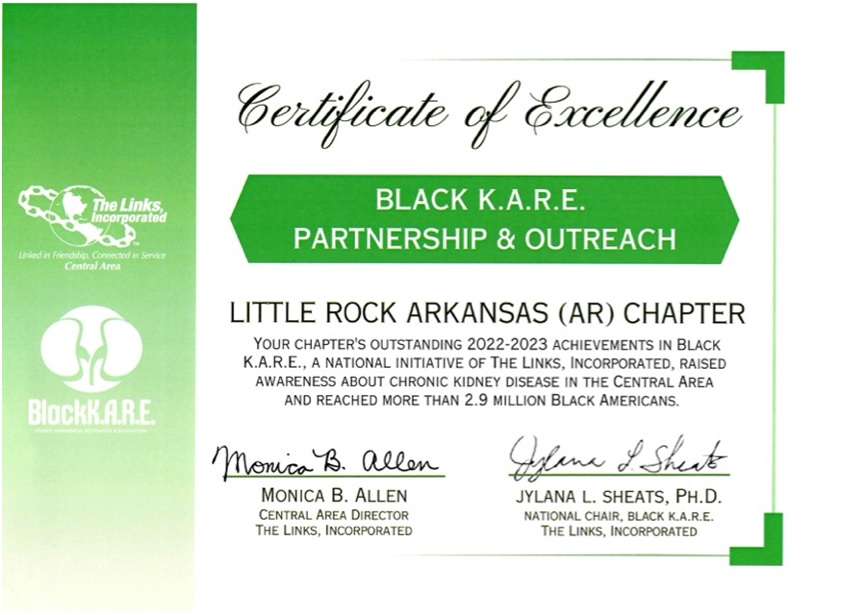

The Little Rock Chapter was recently awarded a $25,000 grant through Central Area Links funded by Baxter Pharmaceutical to race awareness of chronic kidney disease (CKD) in the Black communities.
Black KARE (Kidney Awareness Resources and Education)
Black KARE (Kidney Awareness Resources and Education) plans to increase knowledge of risk factors leading to chronic kidney disease, dialysis, and transplant in Black communities. The effort is to reduce the incidence by prevention through knowledge of risk factors and strategies to reduce or better manage chronic disease such as hypertension, diabetes. https://www.youtube.com/watch?v=EhvFW7NCN6g
Raising awareness of the 3X greater risk of Black Americans developing CKD than Whites and the significant morbidity and mortality for those suffering from CKD. Nearly 1 in 3 people with diabetes and 1 in 5 people with high blood pressure have kidney disease. Despite the prevalence of kidney disease in the United States, as many as 9 in 10 people who have CKD are not aware they have the disease.1 Early-stage kidney disease usually has no symptoms, and many people don’t know they have CKD until it is very advanced. Educating participants about risk factors such as hypertension, diabetes, and obesity, that are prevalent in Black communities, if uncontrolled, often leads to CKD. Educating and empowering participants to take control of their health and lifestyle to mitigate against the downstream impact of poorly controlled chronic conditions contributing to shortened life expectancy. 33% of all dialysis patients are Black. The average life expectancy on dialysis is 5-10 years with a 5-year mortality rate of 50%. Our goal is to educate Black communities about CKD and its devastating impact, to decrease risk factors and overall incidence of CKD and eliminate it as a health disparity.
33% of all dialysis patients are Black Americans, though we are only 13% of the population. Dialysis is associated with significant morbidity and 15-20% mortality rate in 1 year. Additional disparities exist in who gets referred for kidney transplant. Black patients are far less likely to be referred for kidney transplant relegating them to a lifelong dependence on dialysis. Risks is greatest in the first 3 months, with a mortality of 9% per year. Dialysis patients have a 5-year survival rate of under 50%. The average life expectancy of patients on dialysis is 5-10 years. Empowering communities with knowledge to understand the major risks factors, ie hypertension and diabetes is critical in preventing progression of CKD. Partnership with University of Arkansas for Medical Science (UAMS) Culinary Medicine program to deliver healthy eating hands on interactive sessions using “Food as Medicine” curriculum to prevent or control hypertension and diabetes. This education has potential impact on reducing CKD, dialysis, and mortality by reducing risk factors leading to CKD. The Little Rock (AR) Chapter of The Links, Incorporated remains committed to positively impacting and improving lives in our Black communities.
The Links partnered with Longley Baptist Church to recruit 73 of their members with risk factors for CKD like hypertension, diabetes, and obesity to enroll in a medical and nutrition education program paired with hands-on cooking demonstration on health preparation of meals. The program launched in November 2021. Meal kits with ingredients to prepare a meal for 4 were packaged by UAMS Fresh and Reddy program and distributed through the church to participants on Sundays. On Tues PM, Margaret Pauly, RD, lead the group through a virtual cooking class, while Drs. Akilah Jefferson and Gloria Richard-Davis discussed management and prevention of chronic conditions that are risk factors for CKD. 5 Virtual cooking modules preparing the following were held on a Tuesday PM at 6.
- Quinoa vegetable dish
- Apricot Chicken
- Meat loaf
- Fish oven cooked
- Red beans and rice- bonus meal kit distributed at registration.
The demographics and health survey of our participants revealed
- 45% >65, 25% 55-64, 15% 45-54, remainder younger down to 18-24 YO
- 80% female, 20% male
- About 10% high school, 20% some college, 25% college degree and 30 graduate, 50% employed, 40% retired and 5% not employed
- Almost 70% hypertensive, obesity/overweight 40%, diabetes 25%
- Exercise 50% several times per week, other 50% range from never to once per week.
- Mediterranean diet < 10% were very familiar, most had some to no knowledge of the diet
- Meals at home- most prepared meals at home- about 25% 5-7 times and the remainder 1-4 X per week
- Vegetables per day <2 servings about 50%
- Fruits 75% consume < 3 servings per day
What did participants experience??
The program provided 4 weeks of meal boxes for 4 delivered to the church and distributed to participants, paired with virtual 4 cooking/education modules discussing reducing sodium (salt) in foods to reduce hypertension, using complex (multigrain) and not simple carbohydrates to control sugar/glucose levels and adding fiber which helps to control sugar levels as well. While striving to increase exercise and getting 8 hours of sleep per night and reducing stress.
Most participants were very engaged and thankful for the opportunity to improve their knowledge of healthy food choice and control of their diseases The overall impact of the program was education of participants on “Food as Medicine” and how to optimize health and reduce disease through foods. Participants noted reducing salt intake resulted in lowering blood pressure. Also, education on healthy lifestyle has positively impacted their daily routines, ie exercise, reading food labels, etc. They felt better and their overall health had improved. Video interviews and testimonials really tells the story of the real impact for participants. They are asking for more programming like this, which was so helpful in improving their health.
Links Partnered with UAMS Culinary Medicine Program Promotes Kidney Health

https://www.youtube.com/watch?v=KkPzZf9xTQ8
Please, watch this video as it captures the significant impact.
Black KARE delivered health and nutrition education to reduce chronic kidney disease. Watch how the program has had a significant impact on the participants’ lives from our local communities. It has changed their understanding of nutrition and how they can be empowered to reduce their and their families risks for chronic kidney diseases, such as hypertension, diabetes, obesity, etc.

By Kalee Sexton
Jan. 28, 2022
The culinary medicine team at the University of Arkansas for Medical Sciences (UAMS) recently partnered with the Little Rock Chapter of The Links, Inc., and Black Kidney Awareness Resource and Education (KARE) to educate people about chronic kidney disease and prevention.
Black KARE is a program grant funded by Baxter Pharmaceutical to raise awareness about chronic kidney disease (CKD) in Black communities. The Little Rock Chapter of The Links, Inc., organization is a group of professional Black women linked in friendship working together to improve their communities.
CKD is a condition in which kidney function decreases, causing the organs to be unable to filter blood as well as they should. It develops over time and is divided into five stages. Patients in the first four stages can take steps to stop the disease from getting worse while patients in the last stage experience complete kidney failure and require dialysis. Diabetes and high blood pressure are the leading causes of kidney failure.
The culinary medicine team and the Fresh & Reddie program at UAMS worked with the Little Rock Chapter of The Links, Inc., to provide four weeks of boxed meals to 75 participants from Longley Baptist Church and surrounding communities. The UAMS Culinary Medicine program’s registered dietician, Margaret Pauly, hosted Zoom cooking classes in November and December to teach the participants about the role nutrition plays in preventing chronic kidney disease.
Gloria Richard-Davis, M.D., MBA, executive director for UAMS’s Division for Diversity, Equity and Inclusion and the program director and lead instructor for the culinary medicine program, said the program helped patients understand food as medicine to prevent and control chronic disease.
https://news.uams.edu/2022/01/28/uams-culinary-medicine-program-promotes-kidney-health/
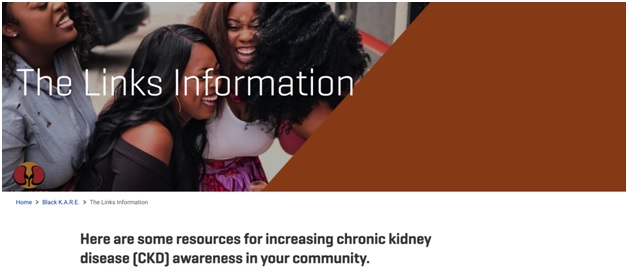
https://www.pdempowers.com/black-kare/links-information
The website link above was created for the Links powered by Baxter Pharmaceutical has a wealth of information on what causes chronic kidney disease (CKD), strategies to reduce the risk of allow risk factors like hypertension and diabetes to progress to CKD, nutrition, recipes, and a wealth of other health information. Check out the website for more information to improve your health!!!
What are the Stages of Chronic Kidney Disease?
Resource:
Chronic kidney disease (CKD) can range from mild to very severe. It is a progressive disease. This means that it can get worse over time if not effectively managed. There is no cure for CKD.
The 5 Stages of Chronic Kidney Disease describe the severity. People can’t tell how bad their CKD is because they often don’t have any symptoms. The earlier CKD is detected, the better the chance of slowing or stopping its progression.
How is Kidney Function Measured?
Your healthcare provider determines your stage of kidney disease based on the presence of kidney damage and your glomerular filtration rate (GFR).
Glomerular filtration rate (GFR) measures how much kidney function you have. A low level of GFR may mean your kidneys are no longer working as well as they should to remove waste from your body.
A math formula is used to calculate eGFR using your blood creatinine level, age, sex, and body size. In adults GFR declines with age, even in people without kidney disease.
Your GFR tells your healthcare provider the stage of kidney disease and helps guide a treatment plan. The earlier kidney disease is detected, the better the chance of slowing or stopping its progression.
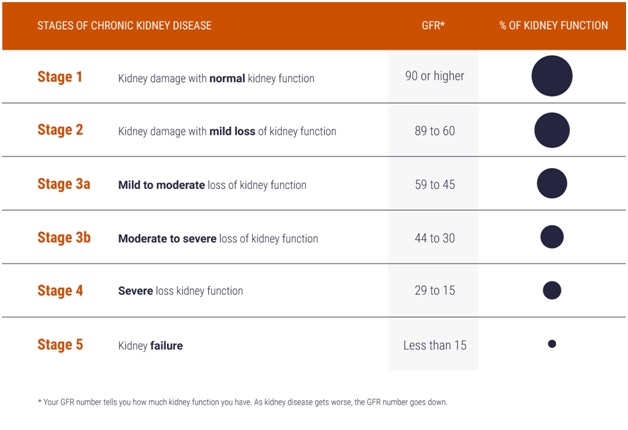
What Are the 5 Stages of Kidney Disease?
Stages of chronic kidney disease (CKD) are based on presence of kidney damage and your GFR. As the stages progress, the percent of kidney function declines. Healthcare providers use this information to plan treatment.
What Are the Symptoms of Chronic Kidney Disease?
Healthy kidneys remove excess fluid and waste from your blood. When your kidneys don’t work as well, excess fluid and waste can build up in your blood and make you feel sick.
In the early stages of kidney disease, many people don’t have any symptoms. Some people don’t know they have chronic kidney disease (CKD) until their kidneys fail. Symptoms usually show up late in the progression of the disease.
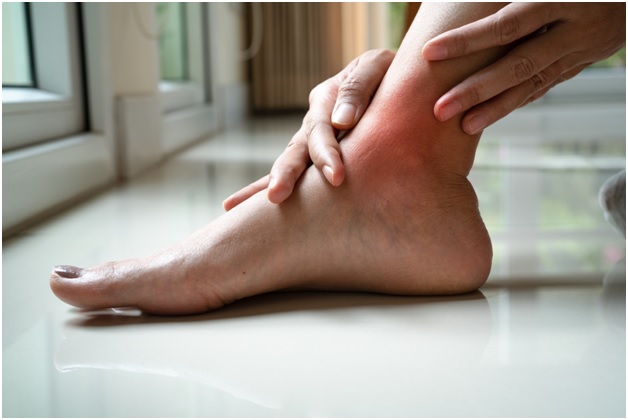
Advanced kidney disease can cause these symptoms:
- Loss of appetite, nausea, or vomiting
- Weight loss
- Feeling week or tired
- Trouble sleeping
- Itching
- Muscle cramps (especially in the legs)
- Swelling of your feet or ankles
- Anemia (a low blood count)
Black KARE website is dedicated to kidney health. https://www.pdempowers.com/black-kare/chronic-kidney-disease-awareness Here you will learn about chronic kidney disease (CKD) and how to prevent it or slow the progression if you already have CKD. Awareness and knowledge will empower you to take charge of your own care with your healthcare team.

Black Americans are almost four times as likely as White Americans to develop kidney failure. While Black Americans make up about approximately 13 percent of the population, they account for approximately 35 percent of the people with kidney failure in the United States. National Institutes of Health.
